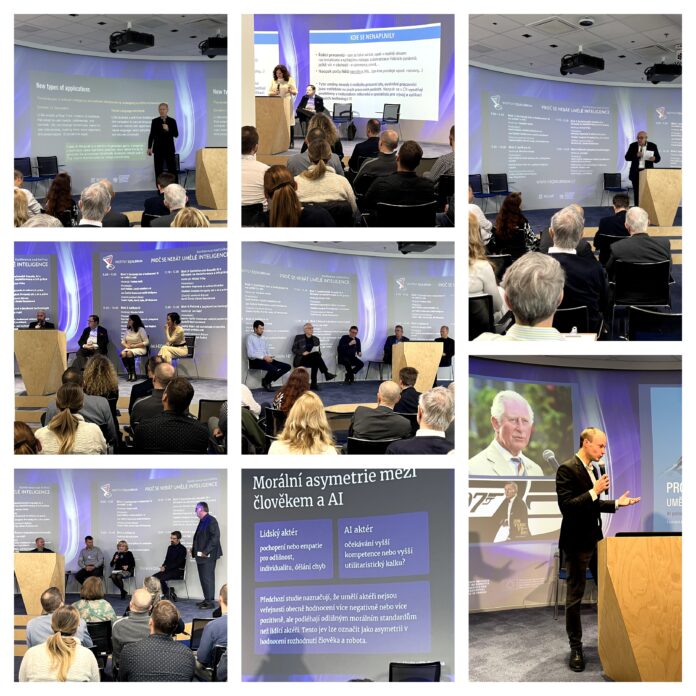Konference Proč se nebát AI, pořádaná Institutem Equllibrium a CIIRC ČVUT 27. 11. 2024 přinesla řadu zajímavých diskusí o vývoji, aplikacích a společenských dopadech umělé inteligence. Účastníci z akademické sféry i praxe se zaměřili na to, jak lze AI efektivně využívat a zároveň řešit její výzvy.
Program plný inspirace
Po zahájení Vladimírem Maříkem, jedním z hlavních organizátorů, začala série tematických bloků. První blok, věnovaný současnému stavu a budoucnosti AI, moderoval Vladimír Mařík a přivítal například Jana Šedivého, který se zabýval fascinujícími možnostmi využití AI k překonávání lidských schopností. Jiří Wiedermann mimo jiné upozornil na energetickou náročnost umělé inteligence, téma, které u nás zatím není vůbec reflektováno, ale které se jako červená nit táhlo celou konferencí. Wiedermann také otevřel citlivé téma zapojení AI pro řešení praktických otázek řízení státu – rozpočtů, obrany apod.
Druhý blok, moderovaný Miroslavem Svítkem, přiblížil aplikace AI, včetně průmyslových řešení prezentovaných Petrem Kaderou a pohledů na využití bezpilotních letounů od Martina Sasky. Diskutující upozornili na klíčový význam kvalitních dat, zejména v medicíně.
Třetí blok se zaměřil na společenské dopady AI. Miroslava Kopicová přiblížila, jak AI ovlivní trh práce, zatímco Vladimír Smejkal se věnoval právním otázkám spojeným s Evropským aktem o AI. Téma dezinformací a jejich prevence rezonovalo napříč diskusí.
Poslední blok patřil řečovým a jazykovým technologiím, blok moderoval Jan Hajič. Martin Fajčík a Ondřej Bojar představili vývoj v oblasti strojového překladu a jazykových modelů, čímž ukázali, jak technologie zásadně mění globální komunikaci.
Hlavní myšlenky a závěry
Diskutující se shodli na tom, že rozvoj AI představuje nejen výzvy, ale především příležitosti. Například podle Jana Šedivého není halucinování jazykových modelů překážkou, nýbrž šancí pro nové objevy. Petr Kadera zase zdůraznil potřebu budování datových center v Evropě, aby firmy nebyly závislé na datových centrech za mořem. Libuše Šmuclerová představila budoucnost médií, které jsou závislé na jediné metrice – a tou je „klik.“ Etik David Černý otevřel i kontroverzní téma – zakazování dezinformačních webů.
Inspirace pro budoucnost
Konference potvrdila, že budoucnost AI spočívá v propojení technologií, etiky a praktického využití. Příspěvky i diskuse zdůraznily důležitost kontinuálního vzdělávání a spolupráce mezi státní správou, akademickou obcí a průmyslem.
Akce byla ukázkou toho, jak může být umělá inteligence motorem inovací a klíčovým nástrojem pro zvyšování produktivity a řešení komplexních problémů.
Program
8.15 – 8.50 Registrace, příchod hostů
8.50 – 9.00 Zahájení Úvodní slovo: Vladimír Mařík
9.00 – 9.50 Blok 1: Současný stav a budoucnost AI ve světě i u nás Moderuje: Vladimír Mařík
Přednášející: Emil Pelikán: Letošní nobelisté a AI Jan Šedivý: Budoucnost umělé inteligence Další účastníci panelové diskuse: Tomáš Pajdla, Martin Suda, Jiří Wiedermann
9.50 – 10.40 Blok 2: Aplikace AI Moderuje: Miroslav Svítek
Přednášející: Petr Kadera: Nové aplikace AI v průmyslové výrobě Martin Saska: Stav AI z pohledu létajících robotů Další účastníci panelové diskuse: Lenka Lhotská, Karel Košnar, Olga Štěpánková
10.40 – 11.10 Coffee break
11.10 – 12.00 Blok 3: Společenské dopady AI s důrazem na dezinformace a trh práce Moderuje: Michal Trčka
Přednášející: Miroslava Kopicová: AI ovlivní trh práce Vladimír Smejkal: Evropský akt o AI a právo Další účastníci panelové diskuse: David Černý, Libuše Šmuclerová
12.00 – 12.50 Blok 4: Řečové a jazykové technologie Moderuje: Jan Hajič
Přednášející: Martin Fajčík: Hodnocení velkých jazykových modelů BenCzechMark Ondřej Bojar: Jak technologie strojového překladu ovládla svět Další účastníci panelové diskuse: Josef Psutka, Jan Šedivý
Knihu Vladimíra Maříka, Michala Trčky, Davida Černého a kol. je možné koupit například ZDE.



